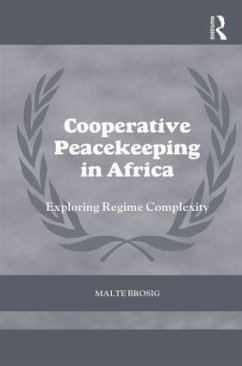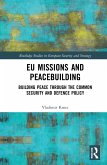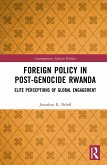This book examines peacekeeping in Africa, exploring how the various actors are forming an African security regime complex. The changing dynamics of peacekeeping in today's world have encouraged a more cooperative approach between international and regional actors. At the centre of this book is the analysis of how an African security regime complex could emerge in the area of cooperative peacekeeping. The African regime complex on peacekeeping includes a number of organizations at the regional and sub-regional African level, as well as global institutions such as the UN, interregional partners like the EU and individual lead nations. This book is the first in providing a systematic overview of peacekeeping doctrines, capacities and deployments of these key actors and single lead states. Theoretically, the book links up with regime complexity scholarship but connects it with dependency theory. Here inter-institutional relations are conceptualised as acts of resource exchange. The book explores how primarily international organizations are partnering by exchanging resources. Empirically, the study analyses the phenomenon of regime complexity in three prominent African crises covering Eastern Africa (Somalia), Central African (Central African Republic) and Western Africa (Mali). This book will be of much interest to students of peacekeeping, international organisations, African politics, security studies and IR in general.
Hinweis: Dieser Artikel kann nur an eine deutsche Lieferadresse ausgeliefert werden.
Hinweis: Dieser Artikel kann nur an eine deutsche Lieferadresse ausgeliefert werden.
'In Africa, "partnership peacekeeping" has become the norm. But how do the complex set of contemporary inter-institutional relationships really work? Malte Brosig's book offers a useful conceptual framework for explaining how peacekeeping works by focusing on the different ways in which resources are transferred across and within international institutions. Case study chapters focused on key theatres (Somalia, Mali and CAR) and key bilateral actors (Nigeria, South Africa, France, UK, US, and China) usefully illustrate the complex interdependence shaping international responses to Africa's recent war zones.' -- Paul D. Williams, The George Washington University, USA
'Malte Brosig's Cooperative Peacekeeping in Africa offers one of the few analysis that is grounded in broader conceptual debates about inter-organizational capacities and cooperation. Equally significant, it provides a comparative perspective of peacekeeping experiences in some of the core crises of the last decades. It fills a major gap in the literature on peacekeeping in Africa.' -- Gilbert M. Khadiagala, University of the Witwatersrand, South Africa
'Contemporary peace operations in Africa are characterised by complex and highly interdependent multiparty relationships. In this book Malte Brosig analyses the emergence of cooperative peacekeeping in Somalia, the Central African Republic and Mali. This book is an important contribution to our understanding of peacekeeping, cooperation and international organisations.' -- Cedric de Coning, Norwegian Institute of International Affairs (NUPI), Norway
'This is a very good primer on a subject of growing importance: peacekeeping in general and within and across Africa specifically. ... an excellent first step in the study of peacekeeping within Africa, but ultimately, it should be only a first step. Summing Up: Highly recommended. Most levels/libraries.'--M. D. Crosston, Bellevue University, CHOICE
'Malte Brosig's Cooperative Peacekeeping in Africa offers one of the few analysis that is grounded in broader conceptual debates about inter-organizational capacities and cooperation. Equally significant, it provides a comparative perspective of peacekeeping experiences in some of the core crises of the last decades. It fills a major gap in the literature on peacekeeping in Africa.' -- Gilbert M. Khadiagala, University of the Witwatersrand, South Africa
'Contemporary peace operations in Africa are characterised by complex and highly interdependent multiparty relationships. In this book Malte Brosig analyses the emergence of cooperative peacekeeping in Somalia, the Central African Republic and Mali. This book is an important contribution to our understanding of peacekeeping, cooperation and international organisations.' -- Cedric de Coning, Norwegian Institute of International Affairs (NUPI), Norway
'This is a very good primer on a subject of growing importance: peacekeeping in general and within and across Africa specifically. ... an excellent first step in the study of peacekeeping within Africa, but ultimately, it should be only a first step. Summing Up: Highly recommended. Most levels/libraries.'--M. D. Crosston, Bellevue University, CHOICE
'In Africa, "partnership peacekeeping" has become the norm. But how do the complex set of contemporary inter-institutional relationships really work? Malte Brosig's book offers a useful conceptual framework for explaining how peacekeeping works by focusing on the different ways in which resources are transferred across and within international institutions. Case study chapters focused on key theatres (Somalia, Mali and CAR) and key bilateral actors (Nigeria, South Africa, France, UK, US, and China) usefully illustrate the complex interdependence shaping international responses to Africa's recent war zones.' -- Paul D. Williams, The George Washington University, USA
'Malte Brosig's Cooperative Peacekeeping in Africa offers one of the few analysis that is grounded in broader conceptual debates about inter-organizational capacities and cooperation. Equally significant, it provides a comparative perspective of peacekeeping experiences in some of the core crises of the last decades. It fills a major gap in the literature on peacekeeping in Africa.' -- Gilbert M. Khadiagala, University of the Witwatersrand, South Africa
'Contemporary peace operations in Africa are characterised by complex and highly interdependent multiparty relationships. In this book Malte Brosig analyses the emergence of cooperative peacekeeping in Somalia, the Central African Republic and Mali. This book is an important contribution to our understanding of peacekeeping, cooperation and international organisations.' -- Cedric de Coning, Norwegian Institute of International Affairs (NUPI), Norway
'This is a very good primer on a subject of growing importance: peacekeeping in general and within and across Africa specifically. ... an excellent first step in the study of peacekeeping within Africa, but ultimately, it should be only a first step. Summing Up: Highly recommended. Most levels/libraries.'--M. D. Crosston, Bellevue University, CHOICE
'Malte Brosig's Cooperative Peacekeeping in Africa offers one of the few analysis that is grounded in broader conceptual debates about inter-organizational capacities and cooperation. Equally significant, it provides a comparative perspective of peacekeeping experiences in some of the core crises of the last decades. It fills a major gap in the literature on peacekeeping in Africa.' -- Gilbert M. Khadiagala, University of the Witwatersrand, South Africa
'Contemporary peace operations in Africa are characterised by complex and highly interdependent multiparty relationships. In this book Malte Brosig analyses the emergence of cooperative peacekeeping in Somalia, the Central African Republic and Mali. This book is an important contribution to our understanding of peacekeeping, cooperation and international organisations.' -- Cedric de Coning, Norwegian Institute of International Affairs (NUPI), Norway
'This is a very good primer on a subject of growing importance: peacekeeping in general and within and across Africa specifically. ... an excellent first step in the study of peacekeeping within Africa, but ultimately, it should be only a first step. Summing Up: Highly recommended. Most levels/libraries.'--M. D. Crosston, Bellevue University, CHOICE








